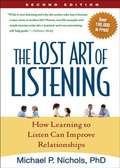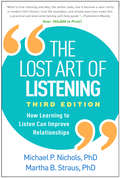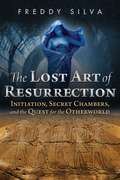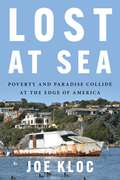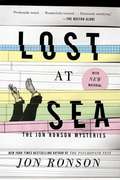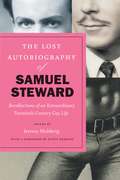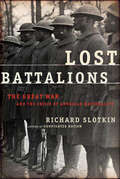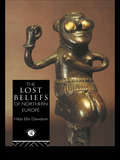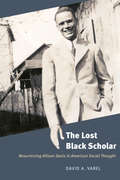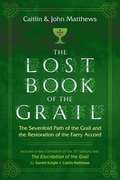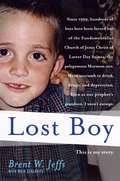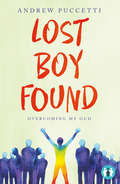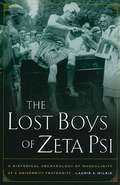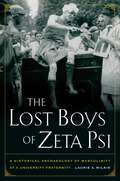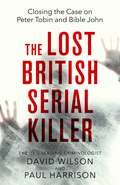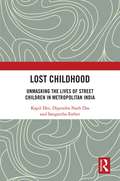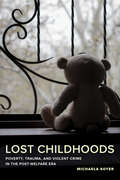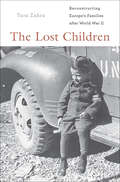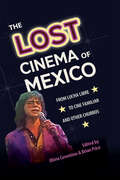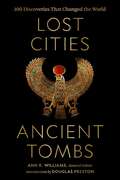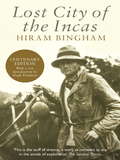- Table View
- List View
Lost Art of Listening, Second Edition
by Michael P. NicholsOne person talks; the other listens. It's so basic that we take it for granted. Unfortunately, most of us think of ourselves as better listeners than we actually are. Why do we so often fail to connect when speaking with family members, romantic partners, colleagues, or friends? How do emotional reactions get in the way of real communication? This thoughtful, witty, and empathic book has already helped over 100,000 readers break through conflicts and transform their personal and professional relationships. Experienced therapist Mike Nichols provides vivid examples, easy-to-learn techniques, and practical exercises for becoming a better listener--and making yourself heard and understood, even in difficult situations.
Lost Art of Listening, Second Edition
by Michael P. NicholsOne person talks; the other listens. It's so basic that we take it for granted. Unfortunately, most of us think of ourselves as better listeners than we actually are. Why do we so often fail to connect when speaking with family members, romantic partners, colleagues, or friends? How do emotional reactions get in the way of real communication? This thoughtful, witty, and empathic book has already helped over 100,000 readers break through conflicts and transform their personal and professional relationships. Experienced therapist Mike Nichols provides vivid examples, easy-to-learn techniques, and practical exercises for becoming a better listener--and making yourself heard and understood, even in difficult situations.
The Lost Art of Listening, Third Edition: How Learning to Listen Can Improve Relationships (Guilford Family Therapy Ser.)
by Michael P. Nichols Martha B. Straus"That isn't what I meant!" Truly listening and being heard is far from simple, even between people who care about each other. This perennial bestseller--now revised and updated for the digital age--analyzes how any conversation can go off the rails and provides essential skills for building mutual understanding. Thoughtful, witty, and empathic, the book is filled with vivid stories of couples, coworkers, friends, and family working through tough emotions and navigating differences of all kinds. Learn ways you can: *Hear what people mean, not just what they say. *Share a difference of opinion without sounding dismissive. *Encourage uncommunicative people to open up. *Make sure both sides get heard in heated discussions. *Get through to someone who never seems to listen. *Ask for support without getting unwanted advice. *Reduce miscommunication in texts and online. From renowned therapist Michael P. Nichols and new coauthor Martha B. Straus, the third edition reflects the huge impact of technology and social media on relationships, and gives advice for talking to loved ones across social and political divides
The Lost Art of Resurrection: Initiation, Secret Chambers, and the Quest for the Otherworld
by Freddy SilvaReveals the radical ancient practice of living resurrection, in which initiates ritually died and were reborn into a state of higher consciousness • Explores living resurrection initiation practices from world cultures, including Egyptian, Greek, Gnostic, Chinese, Celtic, and Native American traditions • Describes the secret chambers and temples where Mystery Schools practiced “raising the dead” • Shows why this practice was branded a heresy and suppressed by the Church More than two thousand years before the resurrection of Jesus, initiates from spiritual traditions around the world were already practicing a secret mystical ritual in which they metaphorically died and were reborn into a higher spiritual state. During this living resurrection, they experienced a transformative spiritual awakening that revealed the nature of reality and the purpose of the soul, described as “rising from the dead.” Exploring the practice of living resurrection in ancient Egyptian, Phoenician, Greek, Persian, Indian, Japanese, Chinese, Celtic, and Native American traditions, Freddy Silva explains how resurrection was never meant for the dead, but for the living--a fact supported by the suppressed Gnostic Gospel of Philip: “Those who say they will die first and then rise are in error. If they do not first receive the resurrection while they live, when they die they will receive nothing.” He reveals how these practices were not only common in the ancient world but also shared similar facets in each tradition: initiates were led through a series of challenging ordeals, retreated for a three-day period into a cave or restricted room, often called a “bridal chamber,” and while out-of-body, became fully conscious of travels in the Otherworld. Upon returning to the body, they were led by priests or priestesses to witness the rising of Sirius or the Equinox sunrise. Silva describes some of the secret chambers around the world where the ritual was performed, including the so-called tomb of Thutmosis III in Egypt, which featured an empty sarcophagus and detailed instructions for the living on how to enter the Otherworld and return alive. He reveals why esoteric and Gnostic sects claimed that the literal resurrection of Jesus promoted by the Church was a fraud and how the Church branded all living resurrection practices as a heresy, relentlessly persecuting the Gnostics to suppress knowledge of this self-empowering experience. He shows how the Knights Templar revived these concepts and how they survive to this day within Freemasonry. Exploring the hidden art of living resurrection, Silva shows how this personal experience of the Divine opened the path to self-empowerment and higher consciousness, leading initiates such as Plato to describe it as the pinnacle of spiritual development.
Lost at Sea: Poverty and Paradise Collide at the Edge of America
by Joe KlocA deeply personal nine-year account of the lives of the “anchor-outs”—an unhoused community living off the California coast on abandoned boats—that explores the struggles and resilience of those surviving on the fringes of society.In the wake of the financial crisis, the number of anchor-outs living in Richardson Bay more than doubles as their long-simmering feud with the wealthy residents of Marin County—one of the richest counties in the country—finally boils over. Many of the shoreline’s well-heeled yacht club members and mansion owners blame their unhoused neighbors for rising crime on the waterfront. Meanwhile, local politicians accuse them of destroying the Bay Area’s marine ecosystem and demand their eviction. When the pandemic breaks out, a slew of city and regional authorities heed the call: they seize and crush the anchor-outs’ boats, arresting dissenters as they dismantle one of the nation’s oldest unhoused communities.Kloc’s near-decade-long firsthand account of the joys, hardships, and eventual demise of the anchor-outs is in many ways the story of being poor in America. Examining the profit-driven policies that exacerbate the contemporary housing crisis, Lost at Sea weaves together tales of comradery and survival on the anchorage with the rich history of the region, from the creation of unspeakable wealth during the San Francisco Gold Rush era to the aftermath of the devastating earthquake and fire of 1906, when the first unhoused people dropped their anchors in Marin County.Along the way, Kloc discovers the quiet beauty of the world the anchor-outs built: how they’ve learned to care for each other, band together to fend off real estate developers and NIMBY neighbors, and fight for a way of life that is entirely unrecognizable to those on shore. Lost at Sea explores the often overlooked world of poverty and homelessness that exists in even the wealthiest enclaves of America, where people who have fallen on hard times struggle to rebuild their lives among those who would rather just wish them away.
Lost at Sea
by Jon RonsonThe New York Times–bestselling author of The Psychopath Test, Jon Ronson writes about the dark, uncanny sides of humanity with clarity and humor. Lost at Sea reveals how deep our collective craziness lies, even in the most mundane circumstances. Ronson investigates the strange things we’re willing to believe in, from lifelike robots programmed with our loved ones’ personalities to indigo children to hypersuccessful spiritual healers to the Insane Clown Posse’s juggalo fans. He looks at ordinary lives that take on extraordinary perspectives, for instance a pop singer whose life’s greatest passion is the coming alien invasion, and the scientist designated to greet those aliens when they arrive. Ronson throws himself into the stories—in a tour de force piece, he splits himself into multiple Ronsons (Happy, Paul, and Titch, among others) to get to the bottom of credit card companies’ predatory tactics and the murky, fabulously wealthy companies behind those tactics. Amateur nuclear physicists, assisted-suicide practitioners, the town of North Pole, Alaska’s Christmas-induced high school mass-murder plot: Ronson explores all these tales with a sense of higher purpose and universality, and suddenly, mid-read, they are stories not about the fringe of society or about people far removed from our own experience, but about all of us. Incisive and hilarious, poignant and maddening, revealing and disturbing—Ronson writes about our modern world, the foibles of contemporary culture, and the chaos that lies at the edge of our daily lives. .
The Lost Autobiography of Samuel Steward: Recollections of an Extraordinary Twentieth-Century Gay Life
by Samuel Steward Jeremy Mulderig Scott HerringOn August 21, 1978, a year before his seventieth birthday, Samuel Steward (1909–93) sat down at his typewriter in Berkeley, California, and began to compose a remarkable autobiography. No one but his closest friends knew the many different identities he had performed during his life: as Samuel Steward, he had been a popular university professor of English; as Phil Sparrow, an accomplished tattoo artist; as Ward Stames, John McAndrews, and Donald Bishop, a prolific essayist in the first European gay magazines; as Phil Andros, the author of a series of popular pornographic gay novels during the 1960s and 1970s. Steward had also moved in the circles of Gertrude Stein, Thornton Wilder, and Alfred Kinsey, among many other notable figures of the twentieth century. And, as a compulsive record keeper, he had maintained a meticulous card-file index throughout his life that documented his 4,500 sexual encounters with more than 800 men. The story of this life would undoubtedly have been a sensation if it had reached publication. But after finishing a 110,000-word draft in 1979, Steward lost interest in the project and subsequently published only a slim volume of selections from his manuscript. In The Lost Autobiography of Samuel Steward, Jeremy Mulderig has integrated Steward’s truncated published text with the text of the original manuscript to create the first extended version of Steward’s autobiography to appear in print—the first sensational, fascinating, and ultimately enlightening story of his many lives told in his own words. The product of a rigorous line-by-line comparison of these two sources and a thoughtful editing of their contents, Mulderig’s thoroughly annotated text is more complete and coherent than either source alone while also remaining faithful to Steward’s style and voice, to his engaging self-deprecation and his droll sense of humor. Compellingly readable and often unexpectedly funny, this newly discovered story of a gay life full of wildly improbable—but nonetheless true—events is destined to become a landmark queer autobiography from the twentieth century.
Lost Battalions: The Great War and the Crisis of American Nationality
by Richard Slotkin"A work of stunning density and penetrating analysis . . . Lost Battalions deploys a narrative symmetry of gratifying complexity."—David Levering Lewis, The NationDuring the bloodiest days of World War I, no soldiers served more valiantly than the African American troops of the 369th Infantry—the fabled Harlem Hellfighters—and the legendary 77th "lost battalion" composed of New York City immigrants. Though these men had lived up to their side of the bargain as loyal American soldiers, the country to which they returned solidified laws and patterns of social behavior that had stigmatized them as second-class citizens.Richard Slotkin takes the pulse of a nation struggling with social inequality during a decisive historical moment, juxtaposing social commentary with battle scenes that display the bravery and solidarity of these men. Enduring grueling maneuvers, and the loss of so many of their brethren, the soldiers in the lost battalions were forever bound by their wartime experience. Both a riveting combat narrative and a brilliant social history, Lost Battalions delivers a richly detailed account of the fierce fight for equality in the shadow of a foreign war.
The Lost Beliefs of Northern Europe
by Dr Hilda Davidson Hilda Ellis DavidsonFragments of ancient belief mingle with folklore and Christian dogma until the original tenets are lost in the myths and psychologies of the intervening years. Hilda Ellis Davidson illustrates how pagan beliefs have been represented and misinterpreted by the Christian tradition, and throws light on the nature of pre-Christian beliefs and how they have been preserved. The Lost Beliefs of Northern Europe stresses both the possibilities and the difficulties of investigating the lost religious beliefs of Northern Europe.
The Lost Black Scholar: Resurrecting Allison Davis in American Social Thought
by David A. VarelAllison Davis (1902–83), a preeminent black scholar and social science pioneer, is perhaps best known for his groundbreaking investigations into inequality, Jim Crow America, and the cultural biases of intelligence testing. Davis, one of America’s first black anthropologists and the first tenured African American professor at a predominantly white university, produced work that had tangible and lasting effects on public policy, including contributions to Brown v. Board of Education, the federal Head Start program, and school testing practices. Yet Davis remains largely absent from the historical record. For someone who generated such an extensive body of work this marginalization is particularly surprising. But it is also revelatory. In The Lost Black Scholar, David A. Varel tells Davis’s compelling story, showing how a combination of institutional racism, disciplinary eclecticism, and iconoclastic thinking effectively sidelined him as an intellectual. A close look at Davis’s career sheds light not only on the racial politics of the academy but also the costs of being an innovator outside of the mainstream. Equally important, Varel argues that Davis exemplifies how black scholars led the way in advancing American social thought. Even though he was rarely acknowledged for it, Davis refuted scientific racism and laid bare the environmental roots of human difference more deftly than most of his white peers, by pushing social science in bold new directions. Varel shows how Davis effectively helped to lay the groundwork for the civil rights movement.
The Lost Book of the Grail: The Sevenfold Path of the Grail and the Restoration of the Faery Accord
by Caitlín Matthews John MatthewsReveals the long-forgotten prequel to the Grail mythos and how it has profound resonance with modern times • Includes the complete text of the Grail prequel, The Elucidation of the Grail, a 13th-century poem newly translated by Gareth Knight and Caitlín Matthews • Examines the forgotten story of the Faery Wars and the role of Well Maidens in the Grail story • Discusses the Seven Guardians of the Stories, the Grail Kings and Anti-Grail Kings, the Rich Company, the Courts of Joy, and the otherworldly Land of Women Unveiling the long-forgotten prequel to the Grail quest stories, Caitlín and John Matthews examine The Elucidation of the Grail, a forgotten 13th-century French text, and show how it offers the key to understanding the sevenfold path of the Grail and the deeper stories beneath the Christian Grail narrative. Beginning with a new translation of The Elucidation by foremost esotericist Gareth Knight and Caitlín Matthews, the authors provide a complete commentary on the poem, revealing a startling alternative cause of the Wasteland and the Grail quest, one which has a profound resonance with our own times. They examine the forgotten story of the Faery Wars and explain the Faery Accord, an agreement that once existed between humans and the Faery and upon which the spiritual and physical health of the land depends. The offering of the Grail and its regenerative powers by the Maidens of the Wells--Faery women--was part of this Accord. King Amangons and his men violated the Accord, through their abuse of the Well Maidens and other evil actions, causing the wasting of the land. The Knights of King Arthur seek to avenge the Well Maidens and rebirth the Grail to restore access to the lost paradisiacal “Courts of Joy” held in ancestral memory. On their quest, they encounter the Rich Company whose greed keeps the Knights occupied in long wars of attrition, yet their quest to restore the generous hospitality of the Wells--the true Grail, the Faery Grail--continues. In addition to the Faery Accord and Knights’ quest, the authors examine the Seven Guardians of the Stories, the Rich Fisher, the Courts of Joy and paradise lost, and the otherworldly Land of Women. They show how this lost book of the Grail reveals themes familiar to the modern world and offers hope of healing the rift between the worlds of Faery and human as well as restoration of our natural belonging to the land.
Lost Boy
by Brent W. Jeffs Maia SzalavitzStarred Review. In this moving debut memoir, the nephew of a Mormon sect leader chronicles life in the Fundamentalist Church of Jesus Christ of Latter Day Saints, and what came after. Among a 10,000-member Mormon community, Jeffs grew up with three mothers, more than a dozen siblings, and a deep fear of the world outside of the church. Within the secretive community, Jeffs was taught that purity came from special attention to dress, hard work, generosity and, most importantly, obedience to one's elders (especially his uncle, the prophet Warren Jeffs). The focus of this fast-paced memoir is the sexual abuse Jeffs and his brothers endured at the hands of their relatives during church and school functions, for which he would file a class-action lawsuit in 2004. Jeffs's descent into depression proves the beginning of the end for his relationship with the church and, consequently, with much of his family. Jeffs outlines the core beliefs of the Church, along with the oppressive ends to which they were used, and the heartbreaking fate of those church members expelled into a society they were raised to see as evil and corrupt. This hard-to-put-down, tightly woven account pulls back the curtain on what's become a perennial news story, while illustrating the impiety of absolute power and the delicacy of innocence. Copyright Reed Business Information, a division of Reed Elsevier Inc. All rights reserved.
Lost Boy Found: Overcoming My OCD (Inspirational Series)
by Andrew PuccettiAndrew Puccetti's life seemed perfect: he grew up in a loving Catholic community, his parents were happily married, and his childhood was good. But this picture-perfect existence started to crack when Andrew began to suffer from intense hypochondria and anxiety. Through therapy, he thought he had recovered, and, as he grew, he began to discover himself. He found the strength to come out as gay to his family, and everything seemed fine for a while.However, when he opened up to his group of friends about his sexuality, not all of them were as accepting as his family had been. Abandoned by his closest friend since childhood, his negative mental thoughts began to return, and Andrew found himself unable to cope with life, and forced to drop out of school. After months of isolation, Andrew took the brave step of admitting himself to a psychiatric hospital. Diagnosed with OCD, major depressive disorder, and borderline personality disorder, Andrew could finally begin to take control of his life. In Lost Boy Found, Andrew courageously tells his story of navigating adolescence through the lens of mental illness and finding peace with his true self.
The Lost Boys of Sudan
by Mark BixlerThis book is about the lost boys of Sudan. These boys were separated from their families by war, and walked to Ethiopia. They migrated to the US, which was a world beyond their wildest dreams.
The Lost Boys of Zeta Psi: A Historical Archaeology of Masculinity at a University Fraternity
by Laurie A. WilkieGleaning history from recent archaeological excavations and from such intriguing sources such as oral histories, architecture, and photographs, the book takes us inside the secret, amusing, and sometimes mundane world of a California fraternity around 1900.
The Lost Boys of Zeta Psi: A Historical Archaeology of Masculinity at a University Fraternity
by Laurie A. WilkieThe Lost Boys of Zeta Psi takes us inside the secret, amusing, and sometimes mundane world of a California fraternity around 1900. Gleaning history from recent archaeological excavations and from such intriguing sources as oral histories, architecture, and photographs, Laurie A. Wilkie uncovers details of everyday life in the first fraternity at the University of California, Berkeley, and sets this story into the rich social and historical context of West Coast America at the turn of the last century. In particular, Wilkie examines men’s coming-of-age experiences in a period when gender roles and relations were undergoing dramatic changes. Her innovative study illuminates shifting notions of masculinity and at the same time reveals new insights about the inner workings of fraternal orders and their role in American society.
The Lost British Serial Killer: Closing the case on Peter Tobin and Bible John
by Paul Harrison David WilsonThe definitive and explosive account of a harrowing murder case that has shocked BritainPeter Tobin was already serving a life sentence for murder when he was charged with the murder of two young women - Vicky Hamilton and Dina McNichol, in November 2007. Both girls went missing in 1991. Their bodies were discovered by police in 50 Irvine Drive, Margate - where Tobin once lived. In their new true crime investigation, Paul Harrison and Professor David Wilson examine this shocking case, including full details of Tobin's trial. But perhaps even more importantly, they look into other similar cases around the country. With developments in DNA testing, the police are coming closer and closer to solving a range of terrible and high profile murders. There have been at least five major arrests in recent months, with further arrests sure to follow.Harrison and Wilson investigate these cases, and ask how new DNA tests will change police investigations. But they also ask whether this will be enough to stop murderers in the future, and whether there are larger forces at work in society that need to be addressed before we can stop people from killing again and again.
The Lost British Serial Killer: Closing the case on Peter Tobin and Bible John
by David Wilson Paul HarrisonThe definitive and explosive account of a harrowing murder case that has shocked BritainPeter Tobin was already serving a life sentence for murder when he was charged with the murder of two young women - Vicky Hamilton and Dina McNichol, in November 2007. Both girls went missing in 1991. Their bodies were discovered by police in 50 Irvine Drive, Margate - where Tobin once lived. In their new true crime investigation, Paul Harrison and Professor David Wilson examine this shocking case, including full details of Tobin's trial. But perhaps even more importantly, they look into other similar cases around the country. With developments in DNA testing, the police are coming closer and closer to solving a range of terrible and high profile murders. There have been at least five major arrests in recent months, with further arrests sure to follow.Harrison and Wilson investigate these cases, and ask how new DNA tests will change police investigations. But they also ask whether this will be enough to stop murderers in the future, and whether there are larger forces at work in society that need to be addressed before we can stop people from killing again and again.
Lost Childhood: Unmasking the Lives of Street Children in Metropolitan India
by Kapil Dev Dipendra Nath Das Sangeetha EstherLost Childhood explores the everyday lives of street children in India. It presents insights on their life on the streets to provide a comprehensive understanding of why they are driven to extreme means of livelihoods. This volume, · Inquiries into the histories of street children, and discusses their socio-economic and socio-demographic characteristics to provide a sense of their living conditions; · Sheds light on the social injustice experienced by these children, their health and hygiene, and also looks at the insecurities faced by the children in their interactions with the society; · Uses detailed field research data to highlight issues that affect the lives of street children such as education, gender discrimination, and their social networks; · Suggests a way forward that would not only benefit street children but will also be of use to the community in understanding their lives, problems, and help explore this issue in further detail. The book will be useful to scholars and researchers of human geography, development studies, child development, urban poverty, and social justice. It will also be of interest to policymakers, social workers, and field workers who work with street children.
Lost Childhoods: Poverty, Trauma, and Violent Crime in the Post-Welfare Era
by Michaela SoyerLost Childhoods focuses on the life-course histories of thirty young men serving time in the Pennsylvania adult prison system for crimes they committed when they were minors. The narratives of these young men, their friends, and relatives reveal the invisible yet deep-seated connection between the childhood traumas they suffered and the violent criminal behavior they committed during adolescence. By living through domestic violence, poverty, the crack epidemic, and other circumstances, these men were forced to grow up fast all while familial ties that should have sustained them were broken at each turn. The book goes on to connect large-scale social policy decisions and their effects on family dynamics and demonstrates the limits of punitive justice.
The Lost Children: Reconstructing Europe's Families after World War II
by Tara Zahra&“This impressive . . . study charts the history of [post WWII] humanitarian relief . . . demonstrating how the institutions of the family became politicized.&” (Library Journal) During the Second World War, an unprecedented number of families were torn apart. As the Nazi empire crumbled, millions roamed the continent in search of their loved ones. The Lost Children tells the story of these families. We see how the reconstruction of families quickly became synonymous with the survival of European civilization itself. Based on original research in German, French, Czech, Polish, and American archives, The Lost Children is a heartbreaking and mesmerizing story. It brings together the histories of eastern and western Europe, and traces the efforts of everyone―from Jewish Holocaust survivors to German refugees, from Communist officials to American social workers―to rebuild the lives of displaced children. It reveals that many seemingly timeless ideals of the family were actually conceived in the concentration camps, orphanages, and refugee camps of the Second World War, and shows how the process of reconstruction shaped Cold War ideologies and ideas about childhood and national identity. This riveting tale of families destroyed by war reverberates in the lost children of today&’s wars and in the compelling issues of international adoption, human rights and humanitarianism, and refugee policies. &“Fascinating.&” ―New Republic &“[A] superb book . . . [A] wide-ranging, exceptionally well-researched study.&” ―Tablet Magazine &“Zahra&’s work is insightful in considering what treatment of lost children can tell us about broader developments in the post-war period, both in terms of how nations interacted with each other and how psychologists understood the impact of war on children.&” —Times Higher Education
The Lost Cinema of Mexico: From Lucha Libre to Cine Familiar and Other Churros (Reframing Media, Technology, and Culture in Latin/o America)
by Olivia Cosentino and Brian PriceThe Lost Cinema of Mexico is the first volume to challenge the dismissal of Mexican filmmaking during the 1960s through 1980s, an era long considered a low-budget departure from the artistic quality and international acclaim of the nation’s earlier Golden Age. This pivotal collection examines the critical implications of discovering, uncovering, and recovering forgotten or ignored films.This largely unexamined era of film reveals shifts in Mexican culture, economics, and societal norms as state-sponsored revolutionary nationalism faltered. During this time, movies were widely embraced by the public as a way to make sense of the rapidly changing realities and values connected to Mexico’s modernization. These essays shine a light on many genres that thrived in these decades: rock churros, campy luchador movies, countercultural superocheros, Black melodramas, family films, and Chili Westerns.Redefining a time usually seen as a cinematic “crisis,” this volume offers a new model of the film auteur shaped by productive tension between highbrow aesthetics, industry shortages, and national audiences. It also traces connections from these Mexican films to Latinx, Latin American, and Hollywood cinema at large.A volume in the series Reframing Media, Technology, and Culture in Latin/o America, edited by Héctor Fernández L’Hoeste and Juan Carlos RodríguezPublication of this work made possible by a Sustaining the Humanities through the American Rescue Plan grant from the National Endowment for the Humanities.
Lost Cities, Ancient Tombs: 100 Discoveries That Changed the World
by `Doglas Preston and ANN R. WilliamsBlending high adventure with history, this chronicle of 100 astonishing discoveries from the Dead Sea Scrolls to the fabulous "Lost City of the Monkey God" tells incredible stories of how explorers and archaeologists have uncovered the clues that illuminate our past. Archaeology is the key that unlocks our deepest history. Ruined cities, golden treasures, cryptic inscriptions, and ornate tombs have been found across the world, and yet these artifacts of ages past often raised more questions than answers. But with the emergence of archaeology as a scientific discipline in the 19th century, everything changed. Illustrated with dazzling photographs, this enlightening narrative tells the story of human civilization through 100 key expeditions, spanning six continents and more than three million years of history. Each account relies on firsthand reports from explorers, antiquarians, and scientists as they crack secret codes, evade looters and political suppression, fall in love, commit a litany of blunders, and uncover ancient curses. Pivotal discoveries include: King Tut's tomb of treasureTerracotta warriors escorting China's first emperor into the afterlifeThe glorious Anglo-Saxon treasure of Sutton-HooGraves of the Scythians, the real Amazon warrior womenNew findings on the grim fate of the colonists of JamestownWith a foreword from bestselling author Douglas Preston, Lost Cities, Ancient Tombs is an expertly curated and breath-taking panorama of the human journey.
Lost Cities and Vanished Civilizations
by Robert SilverbergPOMPEII! TROY! BABYLON! ANGKOR! KNOSSOS! CHICHEN ITZA! The fantastic stories of how men lived at the dawn of civilization!POMPEII -- proud city of the Caesars preserved in its last agonized moment of life by a sudden torrent of volcanic ash. TROY -- the golden treasures of a great mythical city discovered hidden beneath a hilly Turkish town. BABYLON-the great tower of Babel rising over the desert like a modern skyscraper. ANGKOR -- its vine-enshrouded towers brooding over the steaming jungles of Cambodia. KNOSSOS-glittering, maze-like palace, home of the Minotaur, where Cretan aristocracy lived in glittering splendor. CHICHEN ITZA-site of the great Mayan pyramid and the Sacred Well of death. Here are Robert Silverberg's fascinating stories of six great civilizations that lived and died as long as 7,000 years ago and the men who helped to rediscover them.
Lost City of the Incas
by Hiram BinghamFirst published in the 1950s, this is a classic account of the discovery in 1911 of the lost city of Machu Picchu.In 1911 Hiram Bingham, a pre-historian with a love of exotic destinations, set out to Peru in search of the legendary city of Vilcabamba, capital city of the last Inca ruler, Manco Inca. With a combination of doggedness and good fortune he stumbled on the perfectly preserved ruins of Machu Picchu perched on a cloud-capped ledge 2000 feet above the torrent of the Urubamba River. The buildings were of white granite, exquisitely carved blocks each higher than a man. Bingham had not, as it turned out, found Vilcabamba, but he had nevertheless made an astonishing and memorable discovery, which he describes in his bestselling book LOST CITY OF THE INCAS.
